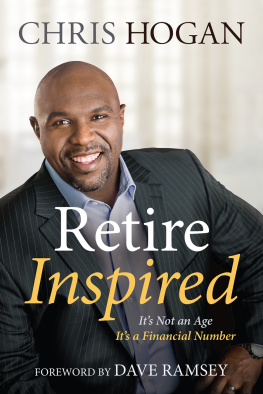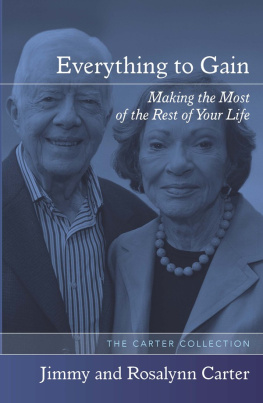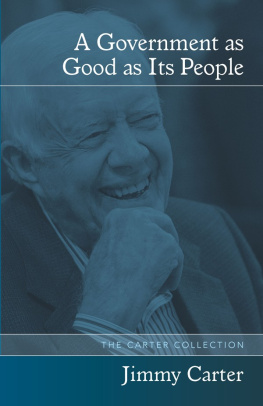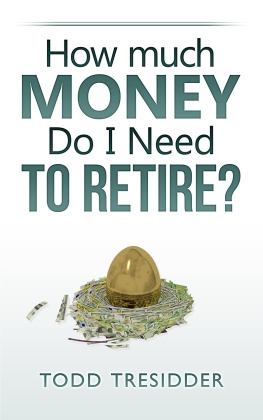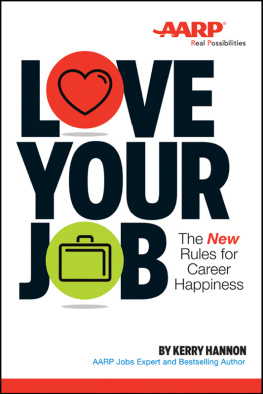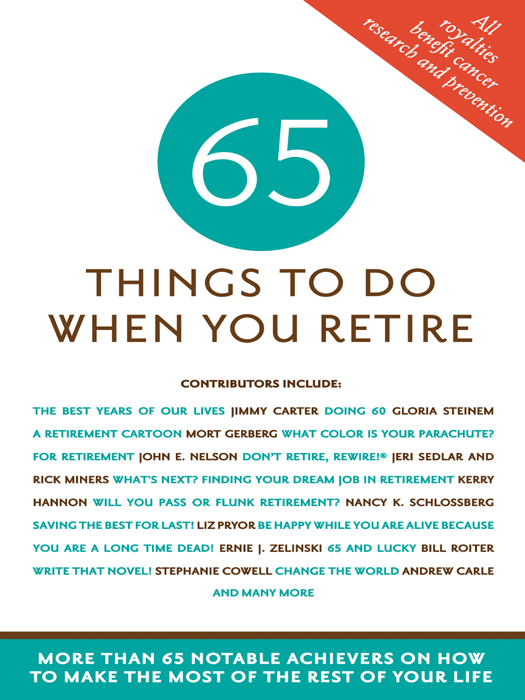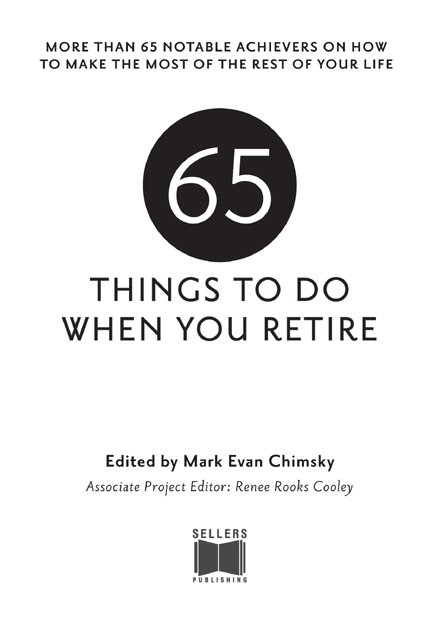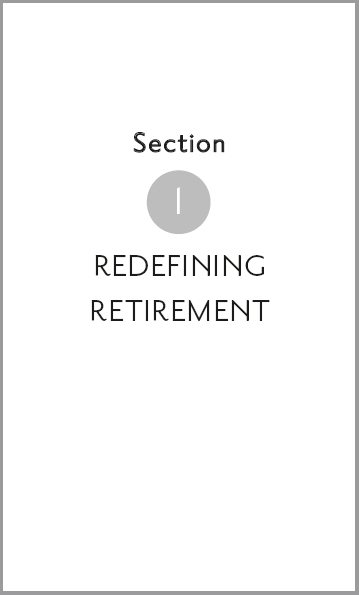Published by Sellers Publishing, Inc.
Design by Faceout Studio
Sellers Publishing, Inc.
161 John Roberts Road, South Portland, Maine 04106
Visit our Web site:
e-ISBN: 978-1-4162-0736-8
65 Things to Do When You Retire copyright 2013 Sellers Publishing, Inc. All rights reserved under International and Pan-American copyright Conventions. By payment of the required fees, you have been granted the nonexclusive, nontransferable right to access and read the text of this e-book onscreen. No part of this text may be reproduced, transmitted, downloaded, decompiled, reverse engineered, or stored or introduced into any information storage and retrieval system, in any form, by any means, whether electronic or mechanical, now known or hereinafter invented, without the express written permission of Sellers Publishing, Inc. e-books.
January 2013
CONTENTS
S ECTION 1
Redefining Retirement
S ECTION 2
Your Retirement Game Plan
S ECTION 3
Do Good By Giving Back
S ECTION 4
How Working in Retirement Can Work for You
S ECTION 5
A New Freedom to Be Yourself
S ECTION 6
Family Matters
S ECTION 7
Go for It!
INTRODUCTION
Welcome to the new world of retirement! Consider 65 Things to Do When You Retire your users manual to making the most of the years ahead. Many retirement guides contain tips and ideas by one or two authors, but we thought, why not provide readers with wisdom and practical advice from more than 65 notable contributors, including experts on the subject as well as achievers in their 60s who have forged unusual and fulfilling paths?
In selecting the contributors for this book, one of our goals was to be as wide-ranging and inclusive as possible, to reveal all the wonderful possibilities that can make retirement rewarding. Youll read true stories of people in retirement who sought meaningful new jobs and volunteer opportunities like Peter and Hinda Schnurman, who write about lending their skills to help communities in the developing world, and Bob Lowry, who shares his dramatic account of working in prison ministry. And there are lively personal essays of achievement by Ruth Heidrich, who won a gold medal in the Senior Olympics; Leigh Anne Jasheway, who teaches stand-up comedy; and Stephanie Cowell, who is pursuing her passion to be a novelist.
We have included essays on how to make the most of retirement, now that its arrived (see essays by Sydney Lagier and John E. Nelson, for example); how to reclaim or discover your purpose or passions (see what Gloria Steinem, Ernie Zelinski, and Sally Paradysz, among others, have to say); how to adjust to retirement when you have to take a spouse or partners needs into consideration (see the essays by Dave DAntoni and Dorian Mintzer); and how to develop smart financial strategies (as discussed by Anna Rappaport, Mark Cussen, Jim Yih, Julie Jason, and Aaron Smith). We even offer up a lighthearted look at retirement by famous cartoonist Mort Gerberg. And last but not least, we are especially honored to be able to include an essay by former president Jimmy Carter. He and his wife, Rosalynn, have taught us by their example how to create a productive and life-affirming retirement by being involved citizens of the world.
It is our hope that this roadmap to retirement will inspire you to dust off dreams that may have been long deferred and to follow your bliss in ways that you didnt even think possible. Remember, the best is yet to come!

Dont Let Retirement Steal Your Bliss!
by Robert Delamontagne
Robert Delamontagne is the author of The Retiring Mind: How to Make the Psychological Transition to Retirement and Honey, Im Home: How to Prevent or Resolve Marriage Conflicts Caused by Retirement. He is the founder and retired chairman of EduNeering Inc. (now Kaplan EduNeering). He earned his Ph.D. in educational psychology from Georgia State University. He currently resides with his wife, Sherrilyn, in New Hope, Pennsylvania, and Marco Island, Florida. He may be contacted at www.theretiringmind.com.
When I retired at the age of 63, I thought I was well prepared for this new stage of life. I sold the company I had founded and managed for 25 years, and at long last I had achieved financial security.
But it came as a shock to me when I discovered that I was not really prepared for my retirement on an emotional level. It should not have come as a surprise, considering that I had lived my life in a very intense and structured way for 35 years and then one day all that familiar structure and mental stimulation were gone. As a result I began experiencing intense irritability and emotional stress. It seemed to get worse over time, and I realized that I needed to get to the bottom of my problem, and quick.
Why didnt anyone warn me that retirement often requires a major psychological adjustment on the same level as the death of a loved one or a bitter divorce? When I began asking friends and acquaintances if they had experienced this problem, I learned to my great surprise that many of them had suffered through a very difficult and painful period after retirement, particularly if the termination of their employment had not been of their own choosing but that of their employer.
I also learned that most were embarrassed to talk about it, because, in most peoples minds, retirement is supposed to be a glorious time of freedom from stress and the normal demands of life. This can also be a very dangerous time for many people because they become susceptible to making life-altering mistakes in order to alleviate stress, such as selling their house and moving to a new location, buying a second home, making poor investments, getting a divorce, or self-medicating with alcohol or drugs.
As I continued to search for the source of my problem, I began talking to more and more people about how they experienced their transition to retirement. I discovered that many who had encountered the greatest difficulty had had very successful careers and suffered from achievement addiction. During their careers, they received a great deal of positive rewards (monetary and emotional) because they were very good at their jobs. Over the years, they began to need this positive feedback as an essential aspect of their existence.
In effect, a large part of their identities were job-related. They defined themselves by what they did, not who they were as people. So for them, retirement represented a subconscious loss of their sense of self.
I immediately realized that this was the primary cause of my emotional distress. A very large part of my identity was being the CEO and chairman of the company I had founded. I saw everything through the prism of the business and what I needed to do to ensure its success. Over time, my very identity became infused with the role I played running the business. I did not see myself as a person independent from what I did for a living it had defined me.


